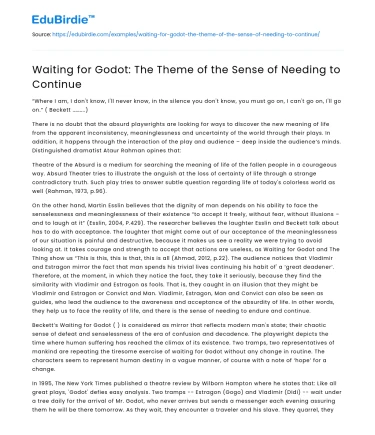“Where I am, I don't know, I'll never know, in the silence you don't know, you must go on, I can't go on, I'll go on.” ( Beckett ………..)
There is no doubt that the absurd playwrights are looking for ways to discover the new meaning of life from the apparent inconsistency, meaninglessness and uncertainty of the world through their plays. In addition, it happens through the interaction of the play and audience – deep inside the audience’s minds. Distinguished dramatist Ataur Rahman opines that:
Theatre of the Absurd is a medium for searching the meaning of life of the fallen people in a courageous way. Absurd Theater tries to illustrate the anguish at the loss of certainty of life through a strange contradictory truth. Such play tries to answer subtle question regarding life of today's colorless world as well (Rahman, 1973, p.96).
On the other hand, Martin Esslin believes that the dignity of man depends on his ability to face the senselessness and meaninglessness of their existence “to accept it freely, without fear, without illusions – and to laugh at it” (Esslin, 2004, P.429). The researcher believes the laughter Esslin and Beckett talk about has to do with acceptance. The laughter that might come out of our acceptance of the meaninglessness of our situation is painful and destructive, because it makes us see a reality we were trying to avoid looking at. It takes courage and strength to accept that actions are useless, as Waiting for Godot and The Thing show us “This is this, this is that, this is all (Ahmad, 2012, p.22). The audience notices that Vladimir and Estragon mirror the fact that man spends his trivial lives continuing his habit of' a ‘great deadener’. Therefore, at the moment, in which they notice the fact, they take it seriously, because they find the similarity with Vladimir and Estragon as fools. That is, they caught in an illusion that they might be Vladimir and Estragon or Convict and Man. Vladimir, Estragon, Man and Convict can also be seen as guides, who lead the audience to the awareness and acceptance of the absurdity of life. In other words, they help us to face the reality of life, and there is the sense of needing to endure and continue.
Beckett’s Waiting for Godot ( ) is considered as mirror that reflects modern man's state; their chaotic sense of defeat and senselessness of the era of confusion and decadence. The playwright depicts the time where human suffering has reached the climax of its existence. Two tramps, two representatives of mankind are repeating the tiresome exercise of waiting for Godot without any change in routine. The characters seem to represent human destiny in a vague manner, of course with a note of ‘hope’ for a change.
In 1995, The New York Times published a theatre review by Wilborn Hampton where he states that: Like all great plays, 'Godot' defies easy analysis. Two tramps -- Estragon (Gogo) and Vladimir (Didi) -- wait under a tree daily for the arrival of Mr. Godot, who never arrives but sends a messenger each evening assuring them he will be there tomorrow. As they wait, they encounter a traveler and his slave. They quarrel, they try on boots and hats, they eat a carrot or a turnip, they urinate, they sing, they play games, they discuss theology and metaphysics, they think (or think they think). They always find something, as Gogo points out, 'to give us the impression we exist.' It all helps to pass the time (Hampton, 1995).
What does it mean? This is typically the major question from anyone who watches the play for the first or dozens time. The truth is that it can mean as much as what we find in it: Some see in its poetic absurdities and blind resilience a thread of hope; others hear quite the opposite, more a dirge of despair. Certainly, one will find, as Eric Bentley put it, ‘the quintessence of existentialism’. “There you are again,” Didi greets Gogo at the outset. “Am I?” Gogo responds ” ( Hampton, 1995).
Thus, they start their journey or once again start from the unending end. If Vladimir and Estragon are there, one can regard that in one of two possibilities, first, their presence in that location should be for a reason which must be ‘waiting’; it is for the promised arrival of Godot. Or, second, they are there because they have no other place and/or option to go to, nor are they capable of moving due to many reasons – physical, emotional, psychological, and economical reasons. So, they preoccupy themselves with the self-invented illusion, it is the arrival of Godot and that gives them hope and energy to cope with the difficulties encountering them. They are confused, lost and uncertain whether the alternatives are better or worse. They do not know where that road would lead them to. Therefore, they convince themselves that Godot will come, even when this has been repeated frequently without the arrival of Godot. They invent excuses by blaming themselves and speaking of uncertainty of the exact days where Godot is supposed to arrive, or even suspecting that there must be some kind of misunderstanding regarding the tree, precisely whether there is another tree or the very bare tree nearby which they keep waiting.
Beckett did not feel that his plays must be taken to mean as nothingness, as he opines, “a sense of restlessness, of moving about in the night” (quoted in Ward, 2015).






 Stuck on your essay?
Stuck on your essay?

